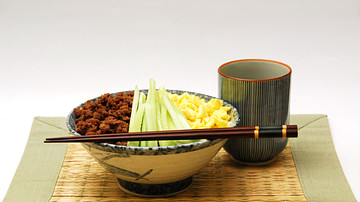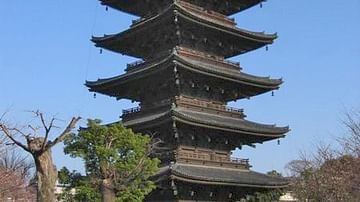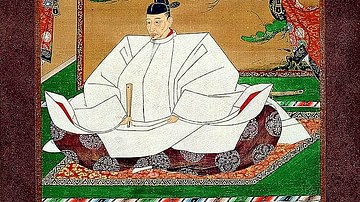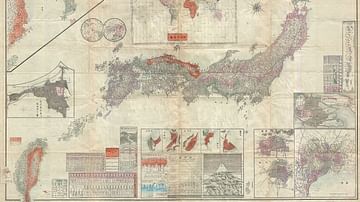Search
Search Results

Article
Food & Agriculture in Ancient Japan
The diet of ancient Japan was heavily influenced by its geography as an archipelago, foodstuffs and eating habits imported from mainland Asia, religious beliefs, and an appreciation for the aesthetic appearance of dishes, not just the taste...

Definition
Heiankyo
Heiankyo (Kyoto), located in the centre of Honshu island, was the capital of Japan for over a thousand years and gave its name to one of the golden ages of Japanese history, the Heian Period (794-1185 CE). Built according to Chinese design...

Definition
Domitian
Domitian was Roman Emperor from 81 to 96 CE and his reign, although one of relative peace and stability, became engulfed in both fear and paranoia. His death at the hands of those who were closest to him brought an end to the short dynasty...

Definition
Toyotomi Hideyoshi - Unifier of Japan
Toyotomi Hideyoshi (1537-1598) was a Japanese military leader who, along with his predecessor Oda Nobunaga (1534-1582) and his successor Tokugawa Ieyasu (1543-1616), is credited with unifying Japan in the 16th century. Hideyoshi rose from...

Article
Buddhism in Ancient Japan
Buddhism was introduced to ancient Japan via Korea in the 6th century CE with various sects following in subsequent centuries via China. It was readily accepted by both the elite and ordinary populace because it confirmed the political and...

Image
Japanese Imperial Regalia
An aritst's impression of three items from the unseen Japanese imperial regalia. In Japanese mythology the sun goddess Amaterasu gave her son Ninigi three gifts to aid his rule on earth: the Yasakani, a fabulous jewel (or pearls or magatama...

Definition
Shogun
The shoguns of medieval Japan were military dictators who ruled the country via a feudal system where a vassal's military service and loyalty was given in return for a lord's patronage. Established as an institution by the first shogun proper...

Definition
Western Roman Empire
The Western Roman Empire is the modern-day term for the western half of the Roman Empire after it was divided in two by the emperor Diocletian (r. 284-305 CE) in c. 285/286 CE. The Romans themselves did not use this term. At its height (c...

Video
Japanese Mythology: Izanagi and Izanami
The creation story of Japan illustrated with Japanese Art. This video describes the birth of the gods Izanagi, Izamani, Amaterasu, Tsukuyomi, and Takehaya Susanoo, and why the emperor is believed to be divine.

Image
Map of the Japanese Empire, 1895
Map of the Japanese Empire, 1895. It was issued shortly after the 1895 Japanese invasion of Taiwan and is consequently one of the first Japanese maps to include Taiwan and Korea as provinces of Imperial Japan. Geographicus Rare Antique Maps...